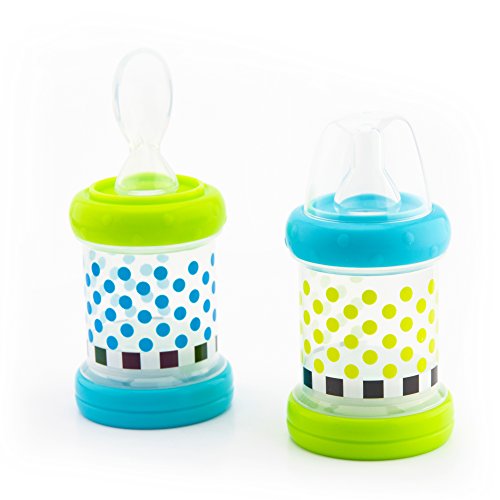As we navigate the process of introducing solid foods and formula into the diet of a 7-month-old, we may reach a point where we are unsure about the balance between milk feedings and solid food introduction.
The change can be a delicate dance of timing and nutrition, ensuring the little one gets all the necessary nutrients without overwhelming their tiny tummies. But what about the nuances of this process? How do we strike that perfect balance without causing confusion or frustration?
Let's explore together the intricacies of feeding a 7-month-old and how to make this journey as smooth as possible.
Key Takeaways
- Balanced nutrition with iron-rich, protein sources, and healthy fats is crucial for a 7-month-old's development.
- Start with simple purees, watch for readiness signs, and gradually introduce solid foods alongside formula or breast milk.
- Follow a structured feeding schedule with milk feeds and nutrient-rich solid meals, adjusting amounts based on hunger cues.
- Introduce allergenic foods cautiously, monitor for reactions, and consult with a pediatrician for guidance and support.

Happy Baby Organics Stage 2 Baby Food Pouches, Gluten Free, Vegan & Healthy Snack, Clearly Crafted Fruit & Veggie Puree, Fruit & Veggie Variety Pack, 4 Ounces (Pack of 10), Amazon Exclusive
Clearly Crafted: When it comes to caring for your baby, transparency is everything. Thats why we bring you…
As an affiliate, we earn on qualifying purchases.
As an affiliate, we earn on qualifying purchases.
Importance of Balanced Nutrition
Balanced nutrition plays an important role in the healthy development and growth of a 7-month-old infant. At this important stage, introducing iron-rich solid foods is essential as adequate iron intake supports brain development and overall growth.
Protein sources such as meat, poultry, beans, and eggs are essential for muscle growth and tissue repair in infants. Additionally, incorporating zinc-rich foods like meat, dairy, and legumes can enhance immune function and cell growth, contributing to a healthy immune system.
Healthy fats from sources like avocados, nut butters, and fish are crucial for brain development and eye health in babies. Ensuring a well-rounded diet that includes these elements not only supports physical growth but also aids in cognitive development and immune system function.

Sassy Baby Food Nurser – 4+ Months Set of 2- 4oz 100% Silicone Nipple and Spoon BPA-Free (30182)
Set of 2 – 4oz Nursery Bottles; one bottle with spoon and one bottle with nipple
As an affiliate, we earn on qualifying purchases.
As an affiliate, we earn on qualifying purchases.
Transitioning to Solid Foods

When looking to expand your 7-month-old's diet beyond milk feeds, starting with simple purees or soft foods can be a gentle introduction to solid foods. At this stage, babies are typically ready to start solid meals, showing signs of readiness like sitting up and displaying interest in what others are eating.
Introduce solids gradually, beginning with single-ingredient purees or mashed fruits and vegetables. Initially, offer solids once a day, gradually increasing to twice a day as your baby becomes accustomed to the new textures and flavors. Remember that breast milk or formula should remain the primary source of nutrition for your baby, with solid foods complementing rather than replacing milk feeds.
Pay close attention to your baby's reactions to new foods, watching for any signs of allergies or intolerances. Providing a variety of nutrient-rich foods will support your baby's growth and development as they explore new tastes and textures in their daily diet.

Beech-Nut Baby & Toddler Food Pouches with Iron & Zinc, Apple Blueberry & Spinach Puree, 3.5 oz (12 Pack)
DELICIOUS BLEND OF APPLE, BLUEBERRY & SPINACH: Each pouch contains 15% recommended daily value of Iron and Zinc,…
As an affiliate, we earn on qualifying purchases.
As an affiliate, we earn on qualifying purchases.
Formula Feeding Guidelines
Shifting to solid foods should be complemented by following appropriate formula feeding guidelines to guarantee your baby's nutritional needs are met effectively. At 6 months old, formula-fed babies typically consume 24-32 oz of formula per day. It's crucial to establish a regular feeding schedule, spacing out feedings evenly throughout the day to make sure your baby is getting the right amount of nutrition.
Pay close attention to hunger and fullness cues, as these can help guide how much to feed your little one. When preparing formula, follow proper guidelines for bottle preparation and storage to maintain its quality. Keep in mind that formula feeding recommendations may differ based on the brand or type of formula suggested by your pediatrician.
As your baby reaches the 6-month milestone, they should be able to start shifting to solid foods gradually while continuing to meet their formula feeding needs. Remember, if you have any questions or concerns about formula feeding, always consult with your pediatrician for personalized advice.

Gerber My First Fruits and Veggies Starter Kit Variety Pack (Variety Pack)
Gerber My 1st Fruits & Veggies: Start your babys lifelong love of fruits & veggies with these single…
As an affiliate, we earn on qualifying purchases.
As an affiliate, we earn on qualifying purchases.
Sample 7-Month-Old Feeding Schedule

To guarantee ideal nutrition for your 7-month-old, establishing a structured feeding schedule comprising milk feeds and solid food meals is essential. At this stage, a typical feeding schedule includes 3-4 milk feeds and 2-3 solid food meals per day.
Each solid food meal can consist of 2-4 tablespoons of pureed food or small soft pieces of finger foods to introduce different textures and flavors. It's important to offer a variety of fruits, vegetables, grains, protein sources, and dairy products to guarantee a balanced diet that supports your baby's growth and development.
Gradually increasing the texture and variety of solid foods can help with oral motor development and acceptance of different foods. Paying attention to your baby's hunger cues and fullness cues is critical to adjusting feeding amounts and timing accordingly.
Introducing Allergenic Foods
Introducing allergenic foods early in your baby's diet can help reduce the risk of developing food allergies. When incorporating these foods into your baby's diet, follow these steps:
- Start Small: Begin with tiny amounts of allergenic foods such as peanuts, tree nuts, dairy, eggs, wheat, soy, fish, and shellfish.
- Watch for Reactions: Be vigilant for any signs of reactions like rashes, hives, vomiting, or other unusual symptoms.
- Gradual Exposure: Slowly increase exposure to allergenic foods over time to help your baby build tolerance and decrease the chance of developing allergies.
- Consultation is Key: Before introducing allergenic foods, especially if there's a family history of food allergies, consult with your pediatrician or an allergist for guidance.
Keep a detailed food diary to monitor your baby's reactions and discuss any concerns with healthcare providers promptly. By being cautious and proactive, you can navigate the introduction of allergenic foods safely and effectively for your little one's health and well-being.
Frequently Asked Questions
Should I Feed Solids and Formula at the Same Time?
We avoid feeding solids and formula simultaneously to maintain nutrient balance. It's best to offer solids after a milk feed when baby is not overly hungry. Follow cues and gradually shift from milk feeds to solid foods.
How Often Should I Feed My Baby After Starting Solids?
After starting solids, we aim to feed our baby solid foods 1-2 times a day, gradually increasing to 3 meals a day by 9-12 months. We continue to offer breast milk or formula alongside solids for proper nutrition and hydration.
Do Babies Need Formula After Starting Solids?
Absolutely, babies still need formula after starting solids. It provides essential nutrients like iron, fat, and protein. Solid foods complement but don't replace formula, ensuring balanced nutrition. Consulting a pediatrician guarantees the right balance for your baby.
How Much Milk Should a 6 Month Old Drink When Eating Solids?
As 6-month-olds begin solids, they should still get 22-28 oz of milk daily. Gradually lessen milk feeds as solid intake increases. Offer milk before solids for essential nutrients. Adjust feeds based on baby's cues.
Conclusion
To start on this journey of introducing solids and formula to our 7-month-old, let's remember to nourish their growing bodies with love and care, like planting seeds in a garden.
By following a balanced feeding schedule and offering a variety of nutritious foods, we're setting the foundation for a healthy relationship with food that will blossom into a lifetime of well-being.
Let's nurture our little ones with the nutrients they need to thrive, just like tending to a delicate flower.









